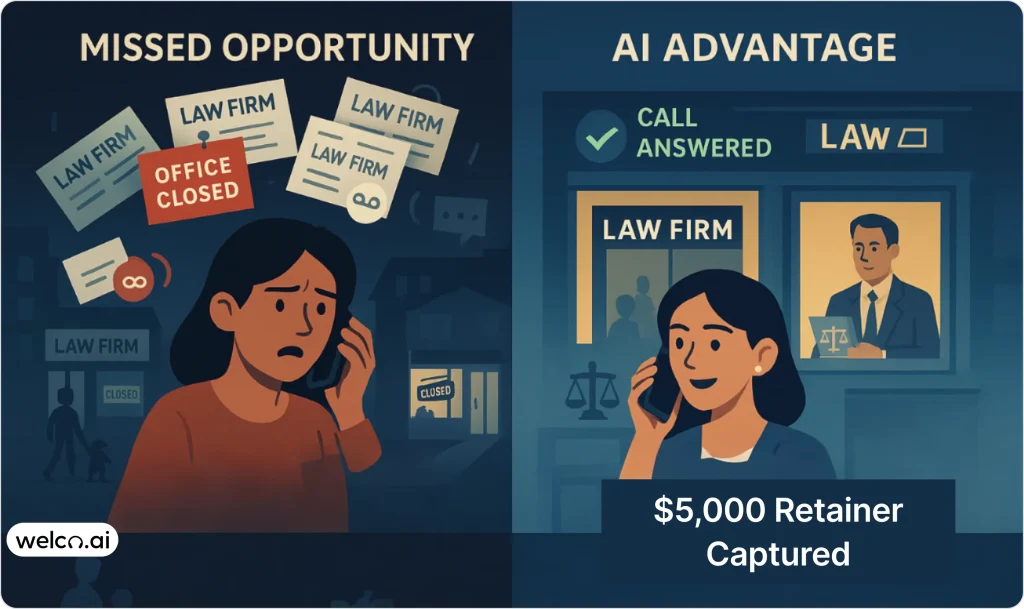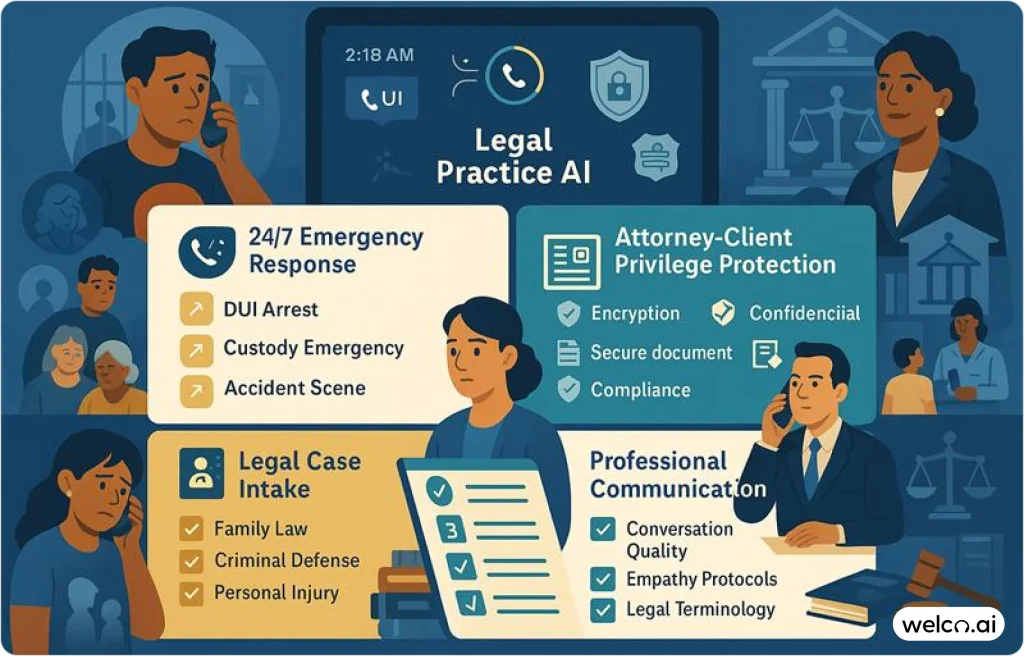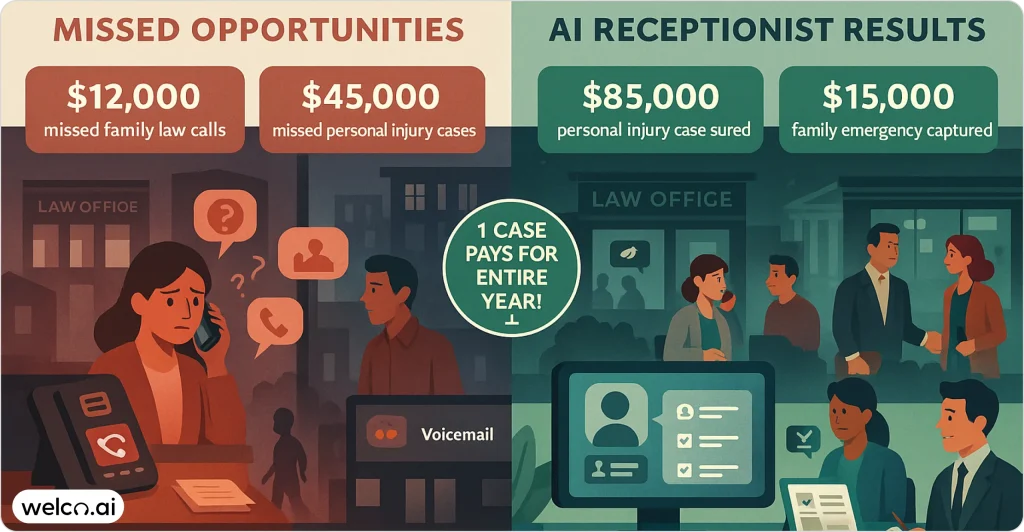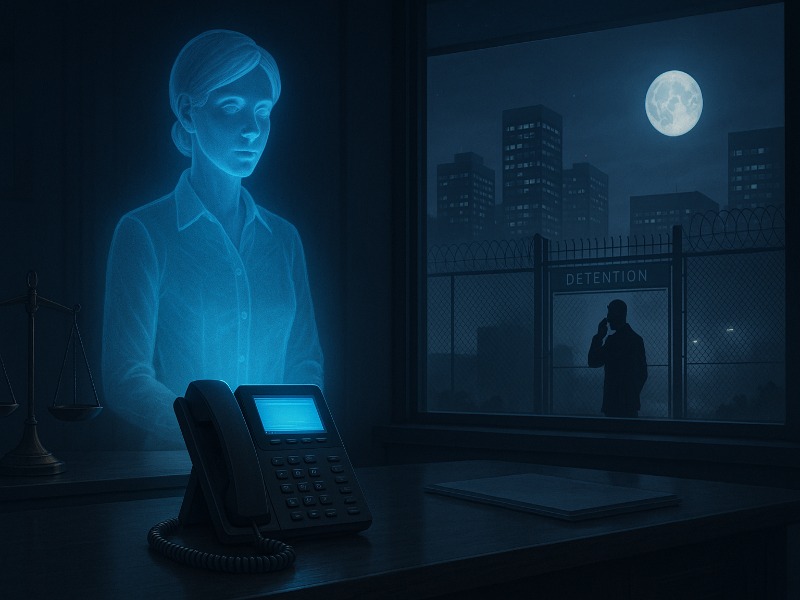Your Competitor Answered. You Didn’t. They Got the $15,000 Retainer.
It’s 7:45 PM on Friday. Sarah Chen’s world is falling apart.

Her ex-husband just showed up drunk to pick up their 8-year-old daughter. Again. She’s terrified, shaking, and needs a family law attorney NOW—not Monday morning when your office opens.
Sarah calls five family law firms. Four go straight to voicemail with that robotic “Your call is important to us” message that means jack squat when your kid’s safety is on the line.
The fifth firm? Their AI receptionist answers immediately, speaks with genuine empathy, and connects Sarah with an attorney within 20 minutes.
That attorney just secured a $15,000 retainer while you were binge-watching Netflix.
The After-Hours Reality Check
Here’s what happened in your city last week while you slept:
Monday, 11:47 PM: Car accident on I-95. Three personal injury firms get called. Only one answers. Case value: $85,000.
Tuesday, 2:30 AM: DUI arrest downtown. Guy calls four criminal attorneys from jail. First one to pick up gets the $8,500 retainer.
Saturday, 6:15 AM: ICE raid in the warehouse district. Twelve families need immigration help immediately. The attorney who answered his phone just signed six new clients.
Sunday, 9:22 PM: Domestic violence situation escalates. Emergency restraining order needed before Monday’s court session. One family law firm was available.
Your competition isn’t just other lawyers anymore. It’s other lawyers with better call management systems.
“But I Have a Legal Answering Service”
Yeah, and it sucks.
Your traditional legal answering service can take a message. They can’t:
- Handle collect calls from county jail (they hang up)
- Recognize when someone needs emergency legal help (they take a message)
- Speak legal terminology without sounding like idiots
- Integrate with your case management software
- Maintain attorney-client privilege properly
There’s a difference between “taking messages” and “capturing clients.”
What Real Legal AI Technology Actually Sounds Like
Bad AI (sounds like a robot):
“Hello. I am an artificial intelligence. Please state your legal matter for processing.”
Good legal AI (sounds professional):
“Hi, this is Maria with Martinez Law Firm. I understand you’re dealing with a legal situation. Can you tell me what’s happening so I can get you the right help?”
The difference? One was built by tech bros. The other was built by people who understand how scared clients sound at 2 AM.
Modern AI receptionist systems designed specifically for legal practices provide professional, compliant 24/7 coverage across all areas of law. Unlike generic answering services, legal-specific AI systems understand the unique confidentiality and compliance requirements of attorney-client communications – similar to how AI receptionists for healthcare practices (HIPAA compliance) handle sensitive medical information.

The Math That Should Terrify You
Average missed calls per month:
- Family law: 15 calls (avg. value $12,000 each)
- Personal injury: 12 calls (avg. value $45,000 each)
- Criminal defense: 14 calls (avg. value $7,500 each)
Pick any ONE of those numbers. That’s what you’re losing monthly because your phone goes to voicemail.
That $45,000 personal injury case? That’s your kid’s college fund. Your mortgage payment. Your retirement contribution. And it just called your competitor instead.

“What If This AI Thing Screws Up?”
Fair question. Let me address your real concerns:
“What if it gives legal advice?”
It won’t. Legal AI is programmed like a paranoid first-year associate. If someone asks for legal advice, it says: “I need to connect you with Attorney Smith immediately for legal guidance.”
It’s actually MORE cautious than your paralegal.
“What if it sounds like a robot?”
Only if you buy cheap AI. Good legal AI sounds like your best receptionist having a professional conversation. Clients care more about getting help than whether it’s human—as long as it doesn’t sound like Siri.
This professional approach extends across industries – from hospitality industry reception solutions that handle guest services to specialized legal communications that require empathy and understanding.
“What about attorney after hours coverage?”
Most carriers now have specific AI guidelines for law firm technology. Many actually PREFER it because:
- Every conversation is documented
- No human errors in message-taking
- Better client communication = fewer complaints
Your insurance company is more worried about missed calls than AI calls.
“Security and confidential call management?”
Your current legal answering service: Karen scribbles client details on whatever’s handy, leaves messages on her desk overnight, has zero encryption, and probably discusses your cases with her boyfriend. One coffee spill and your client’s custody battle details are readable by the cleaning crew.
AI receptionist for law firms: AES-256 encryption, SOC 2 compliance, attorney-client privilege from first contact, tamper-proof documentation, zero human gossip factor.
Which sounds more secure to you?
What This Legal AI Automation Actually Costs vs. What You’re Losing
The Investment:
- Monthly: $347-$597 (varies by firm size)
- Setup: $950-$1,500 one-time
- Total first year: $5,114-$8,664
What You’re Currently Losing:
- One missed PI case = $45,000
- One missed criminal case = $8,000
- One missed family law emergency = $15,000
Math check: ONE additional case pays for the entire year.
This client intake approach has proven effective across various sectors, from professional services client intake to specialized legal practices, with many firms seeing ROI within the first month of implementation.
Real Lawyers, Real Results
“Look, I was skeptical as hell about AI anything. But at 2:47 AM on a Tuesday, this thing handled a DUI call better than my paralegal does during business hours. Took three callbacks and some back-and-forth, but we locked up the $8,500 retainer before I was fully awake. My old answering service would’ve just let it ring.”
– Criminal defense attorney, Denver
“Personal injury case came in maybe 20 minutes after the accident happened. AI gathered the basics while they were still shaken up at the scene. Had to follow up with more questions the next morning, but by the time other firms started calling, we were already retained. $85,000 case that I almost missed because I was at my kid’s soccer game.”
– PI lawyer, Miami
“Sunday morning custody emergency – ex-husband violated the order again. AI documented everything, got me on the phone within ten minutes, scheduled the emergency hearing. Client retained us before I finished my coffee. My old answering service would’ve said ‘call back Monday’ and this family would still be in danger.”
– Family law attorney, Phoenix
The Implementation Truth
Week 1: Setup and security configuration
Week 2: Connect to your phones and case management
Week 3: Test with real scenarios
Week 4: Go live
Average time to capture first case: Usually within the first week of testing.
Most common feedback: “Why didn’t we do this sooner?”
The implementation success mirrors patterns seen across industries, from small business growth through AI reception to large enterprise deployments, with consistent results in improved client capture rates.
What About the Horror Stories?
“But what if this thing catastrophically screws up?”
Fair concern. We’ve all seen AI disasters in the news. Chatbots giving terrible advice. Voice recognition that can’t understand anyone with an accent. Systems crashing during emergencies.
Here’s the difference: Legal AI automation is built by paranoid lawyers, not Silicon Valley optimists.
Disaster Planning Built In:
- System crashes? Calls automatically route to your backup numbers within 15 seconds
- AI can’t understand someone? Human backup kicks in immediately
- Client gets angry at the AI? Escalation protocols transfer them instantly
- Power outage at the data center? Multiple redundant systems in different locations
- State bar changes AI rules overnight? System updates automatically to comply
The Nuclear Option: Every AI phone system for lawyers has a “kill switch” that instantly routes all calls to human backup if anything goes wrong.
Real lawyer paranoia: The system assumes something will go wrong and plans for it. Because that’s how lawyers think.
Similar reliability standards are essential across sensitive industries – financial services compliance and security requires the same level of redundancy and disaster planning that legal practices demand.
Three Choices
- Keep missing calls – and keep losing cases to competitors
- Get a generic attorney answering service – and still lose to firms with real legal AI
- Get an AI receptionist for law firms – and start answering when it matters
Law firms with AI virtual receptionist services? They’re the ones answering at 2 AM while you’re sending calls to voicemail.
Firms sticking with traditional systems keep wondering where their cases went.
This competitive advantage extends beyond legal practices – real estate lead qualification and management and retail and e-commerce customer support have seen similar transformations in client acquisition and retention.
The Uncomfortable Truth
Every week you wait, competitors are capturing cases you could have had.
Every emergency call that goes to voicemail is revenue walking to another firm.
Every potential client who can’t reach you at 2 AM is telling their friends about the attorney who DID answer.
Your choice: Start answering, or keep losing.
Ready to Stop Losing Cases?
15-minute reality check – Find out exactly what you’re losing:
- How many calls your practice misses after-hours
- Live demo of legal virtual receptionist handling your practice area
- State compliance verification for AI legal technology
- Revenue projections based on your current case volume
Find out exactly what you’re losing to competitors who answer their phones 24/7.
Or keep wondering what cases you missed last weekend.
Frequently Asked Questions
How does an AI receptionist maintain attorney-client privilege during initial calls?
The AI is programmed with strict confidentiality protocols from the moment someone calls. It treats every conversation as privileged, uses encrypted communications, provides tamper-proof documentation, and never stores sensitive information on external servers. It’s actually more secure than human receptionists who might accidentally discuss cases or leave notes lying around.
What happens if the AI can’t handle a complex legal emergency at 2 AM?
That’s exactly when the system shines. It’s trained to recognize legal emergencies (custody violations, arrests, accidents) and has instant escalation protocols. Within 30 seconds, it connects to human backup or directly to your emergency line. The AI assumes every after-hours call could be urgent and errs on the side of caution.
Can AI really screen potential clients as well as my paralegal does?
Better, actually. The AI asks consistent qualifying questions every time, never has a bad day, and doesn’t get emotionally involved. It screens for jurisdiction, case type, budget, and urgency using your exact criteria. Plus, it documents everything perfectly – no more “I think they said something about a car accident” messages.
Will using AI reception hurt my firm’s professional reputation with other attorneys?
The opposite. Forward-thinking firms using AI reception are capturing cases that traditional firms miss entirely. When opposing counsel can’t reach their own clients at 2 AM but yours can, who looks more professional? AI reception is becoming the new standard – you’ll look behind the times without it.
What’s the real cost difference between AI reception and hiring another staff member?
A full-time receptionist costs $35,000-$50,000 annually plus benefits, only works 40 hours/week, takes vacations, and calls in sick. AI reception costs $4,000-$7,000 annually, works 24/7/365, never misses a call, and typically pays for itself with just one additional case captured per year. It’s not even close.
